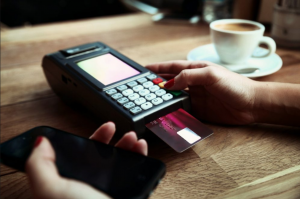Asteria Lending Inc. Unit 306 3/F 6762 National Life Insurance Bldg. San Lorenzo, Ayala Ave. Makati City
We’re Open: Mondays – Fridays
Office Hours:
9:00 am – 7:00 pm
Email:
[email protected]

The third-quarter survey showed respondents who used debit and credit cards, as well as cash, outnumbered those who use only cash. From the survey, about 39% used debit cards in the previous three months and 34% used credit cards. Just 31% used only cash. Filipinos do not only use cashless transactions to pay bills; online shopping was cited as the most common reason
With a young consumer population and strong economic growth, the Philippines will see a rise in cashless payments. The central bank is pushing for online interbank transactions and telcos invest in mobile payment technology. Collaboration between telcos and banks would also lead to better e-money access.

Access to a convenient and reliable cashless payment system remains an issue in the Philippines, however. For example, the bank account holders are unable to conduct online cash transfers from one bank to another.
Also, this is true for the country’s telecoms duopoly, PLDT and Globe Telecom, which have entered the cashless payment business with their mobile payment apps. PLDT’s PayMaya and Globe’s GCash are two of the most popular, but they are incompatible with each other.
This incompatibility has hindered cashless payment penetration. BSP aims to enable consumers with a single e-wallet or online account to carry out a cashless transaction anytime, anywhere. “The vision is that anyone should be able to transact financial services using a smartphone,” Mr Espenilla told FTCR.
The central bank, to that end, is introducing a platform that will allow interbank electronic fund transfers. Starting from November 2017, the rollout will be gradual, covering 33 banks and other mobile payment institutions, but the BSP expects more players to participate as demand increases. This will help to sustain the growth of cashless transactions, which has been strong since 2010.
The central bank is also planning a platform that will allow real-time online transactions. All these developments are taking place as the banks face a challenge from telcos, which are also forging ahead with new technology.
In 2017, GCash launched a system that allows smartphones to scan Quick Response (QR) codes for payments in shops, mirroring developments in other Asian countries. This was after Jack Ma’s Ant Financial Services Group bought a 45 per cent stake in GCash’s holding company last February. Meanwhile, PayMaya tied up with Facebook so consumers can send money and pay bills through the social network’s Messenger app.
Local telecom companies’ alliances with many foreign players should lead to higher investment in technology and allow them to expand their cashless payment services. PayMaya and GCash currently only have one million and five million users respectively, much lower than their mobile customer base.
Banks, meanwhile, are having to upgrade their technology to improve cybersecurity. The BDO Unibank and Bank of the Philippine Islands (BPI), which are the country’s two largest lenders in asset terms, in June suffered a systemic glitch in their IT systems, causing lots of panic among their customers and promoting a Senate investigation.
This incident shows the lack of trust among Filipinos in banking security. The FTCR study showed 89 per cent of Filipinos were concerned about the privacy of their financial data when conducting online transactions, the highest among the Asean-5.
Philippine banks are profitable and healthy but installing new cybersecurity measures is costly in the absence of foreign investors. The central bank has extended the deadline for banks to beef up their security and reporting procedures.
The slow pace of action indicates that cashless innovations will take time, dragging on consumer confidence in the sector.
A number of rural banks have tied up with GCash to allow farmers and fishermen access to mobile banking. They have also forged a deal with PLDT’s FINTQnologies to allow customers to get cheaper loans using a mobile banking platform. The major banks are also working with telcos of the same business group, as in the case of BPI and GCash – both owned by the conglomerate Ayala Corp – to allow fund transfer between customers. This collaboration will fit with the government’s development goal of growing mobile payments in an archipelago where financial inclusion remains a problem.